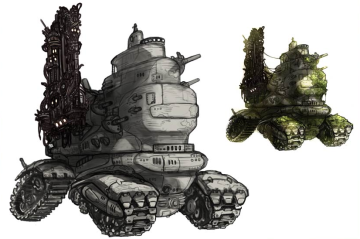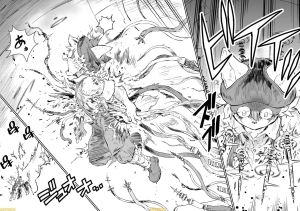Taranis

|
CONTENT WARNING
This page contains artistic depictions of gore. Continue at your own risk. |

|
"I'll make you regret ever being born!"
This article contains Fuga: Melodies of Steel spoilers, continue at your own risk. |

The Taranis is a pseudo-Juno weapon featured in Fuga: Melodies of Steel. It is first found by Mei Marzipan within a mountain's cave in "How It All Began", while the in-game story instead has the children of Petit Mona find it through the radio.
Structure
The Taranis is an incredibly large tank that is able to contain about 12 individuals at a time. It has multiple rooms that house all survival basics for its inhabitants. This includes a workshop, bedroom, messroom, observation area, and a farming area that's capable of growing food & housing two livestock.
Its size completely overshadows the majority of other military vehicles that are seen throughout the Free Lands of Gasco, even almost pummeling a few tanks belonging to the Berman Empire. The caterpillar tracks have no trouble traversing through most terrains and can even potentially plow through villages.
In Fuga 1 the tank has a Personality OS within it named Jeanne, who can project herself through holograms and guide whoever is piloting it. She is also capable of monitoring all of its mechanisms.
Radio
Inside the Taranis is an old-fashioned radio that serves as a form of communication for Jeanne's other half. Through it, she encourages the children to keep moving forward and sometimes insists on utilizing the Soul Cannon.
Soul Cannon
The most powerful component of the Taranis is the Soul Cannon, which requires a sacrifice for utilization. It's only to be used when its inhabitants are in dire straits.
To activate the Soul Cannon, a sacrifice must ready themselves into the basement's Soul Cannon Chamber which holds a single seat. When its door opens it releases what sounds like screams and cries of past sacrifices. Once the sacrifice is seated and closed in, Jeanne announces a brace for shock and activates its auto target function. The cannon, with the tank's tendrils glowing and exposed, then turns over to the front, expands, and fires.
In the first Fuga title when a character is chosen for the required firing, it appears that an unknown force, which in the game's art book is referred to as being a place of its own, manipulates whoever enters the chamber's room into locking themselves in a sacrifice. It is never heard speaking but it's clear that it will outright lie to a victim, such as the promise of seeing family or that peace is soon to come. This mental meddling does not appear to be Jeanne's doing as her primary goal is to keep the entire crew alive. She is also taken aback when the crew realizes where their one friend has gone.

While Fuga: Melodies of Steel presents the chamber as swiftly disintegrating its sacrifice, its manga exposes the entire process to be extremely brutal and violent. Once the door shuts, sacrifices will first be impaled by multiple barbed tendrils before melting to death and ultimately disappearing within its bright light. If the door is opened soon after a sacrifice is complete, all that will be left is copious amounts of blood. In the art book, this process is detailed through ineligible ancient texts that imply demonic forces are behind it.
It's possible to instead utilize a dummy to trick the Soul Cannon into firing, saving any living beings inside the Taranis from being put through a sacrifice.
Jeanne's Counterpart
An artificial human child, who Jeanne refers as her "counterpart" in her archives, is stored deep inside the Taranis. He was only found when Jeanne sought an alternative way to fire the Soul Cannon in Fuga's best ending.
History
The Era of Humanity
The Taranis was first made in the tumultuous era of humanity by Crusade. With the rise of Titano-Machina, many nations sought to find a way to fight against them without collateral damage. This led to the Taranis being formed, with the AI Jeanne eventually being inserted into it as part of its functions. It was named Taranis after the Celtic God of Thunder.
It eventually fought and defeated the Vanargand with its Soul Cannon. In doing so however, fell into a pit and was lost for many years. The AI Jeanne was split into two halves, an older, more logical voice on the radio that was nonetheless overwhelmed with the desire to kill Vanargand once more, and a younger, more empathetic hologram of light that put the lives of its crew first.
Consumed by the desire to prove itself, the voice on the radio created the legend of the Devil (the Taranis) and God (Tarascus) and manipulated Shvein Hax to awaken Vanargand once more, making it wholly responsible for the tragedies and catastrophes of the game. It then called the children together to pilot the tank and coaxed them to pursue the Berman army in order to save their families. Its true motivations were revealed once it faced the Tarascus, showing its true colors as a sadist thirsting to defeat its old enemy.
Throughout the journey, the girl of light made several appearances urging the children not to fight. However, because the children were made to save their families, they had no choice but to. In the wake of the fights with the Tarascus and Britz, and following the Vanargand's reawakening, the caring side finally confronted her logical side. This finally led to the two reuniting into the true Jeanne and guiding the children in order to save Gasco.
In Fuga 1, its fate differs depending on the ending. In one, it despairs over having sacrificed one of the children and becomes mangled beyond repair. Canonically the Taranis rests peacefully in the remains of old Paresia and the Vanargand, with Jeanne having finally faded away, leaving the future to the children.
Trivia
- In-game files for Fuga 1 reveal that the Taranis was to feature a more expansive selection of music that would change depending on which room the player was currently in. This idea was scrapped sometime in development and would be replaced with a single song in the final product.
